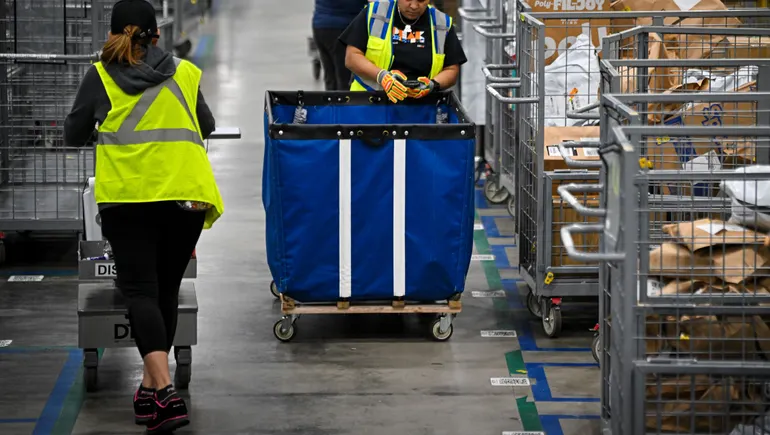Dive Brief:
- Amazon allegedly refused to grant leave to, and then fired, a warehouse worker in Orlando with a life-threatening ectopic pregnancy, according to a federal lawsuit filed May 29 in Florida (Joseph v. Amazon.com Services LLC).
- Before her first missed shift, the worker notified Amazon of her diagnosis via an employee app, the complaint said. In the notice, she also requested an unpaid, five-week leave of absence to undergo surgery and recover from having the embryo and her right fallopian tube removed. She additionally emailed her HR contact about her diagnosis and leave request, according to the complaint. Following the five-week period, her healthcare provider faxed Amazon confirmation of her ectopic pregnancy, surgery and recovery time, the lawsuit alleged.
- Amazon then allegedly refused to grant the worker’s request for leave and fired her because she wasn’t approved for leave. The worker sued Amazon, claiming violations of the Pregnant Workers Fairness Act, the Americans with Disabilities Act, the Florida Civil Rights Act and the Family and Medical Leave Act. Amazon did not respond to a request for comment.
Dive Insight:
The PWFA is an accommodation statute, according to a U.S. Equal Employment Opportunity Commission guidance.
The PWFA’s accommodation requirement is broader than the ADA — unlike the latter, the PWFA’s requirement applies even if the pregnancy-related condition isn’t severe. But like the ADA, an accommodation is not required if it would impose an undue hardship on the employer.
Finalized in April 2024, EEOC regulations defined pregnancy-related conditions as including “termination of pregnancy, including via miscarriage, stillbirth or abortion.” However, on May 21 of this year, a federal judge in Louisiana vacated the portion of the regulation requiring employers to provide accommodations for elective abortions.
Importantly, the judge made clear the order does not affect terminations of pregnancy or abortions stemming from the underlying treatment of a medical condition related to pregnancy.
And in an October 2024 settlement, the EEOC confirmed the PWFA covers stillbirth. In that case, a Ft. Lauderdale resort agreed to pay $100,000 to resolve EEOC allegations it failed to accommodate and fired an employee after she asked for leave following her baby’s stillbirth.
Employers may want to keep in mind that pregnancy-related issues under the PWFA often intersect with other statutes, such as the ADA and the FMLA.
For instance, the ADA requires, absent undue hardship, the employer to provide a reasonable accommodation for a pregnancy-related disability, EEOC documents state. Under both the PWFA and the ADA, leave is considered a reasonable accommodation.
Regardless of outcome, employers should engage in an interactive process with employees requesting accommodation, EEOC has said. The Amazon worker alleged the company denied her request and fired her without ever engaging in the process.
She also alleged that Amazon violated the FMLA, which entitles an eligible employee to 12 weeks’ unpaid leave in a calendar year for a “serious medical condition.”
U.S. Department of Labor regulations define “serious medical condition” as “an illness, injury, impairment or physical or mental condition that involves inpatient care or continuing treatment by a health care provider.”
This includes “any period of incapacity related to pregnancy or for prenatal care,” according to DOL.






Leave a Reply